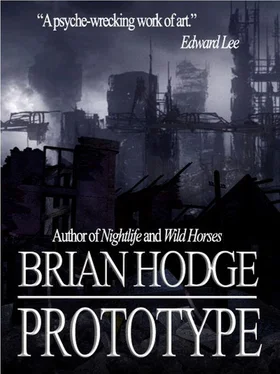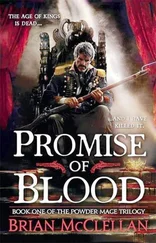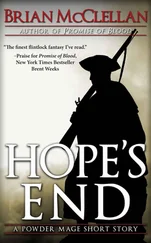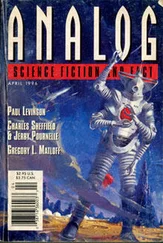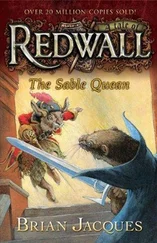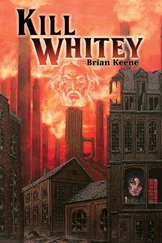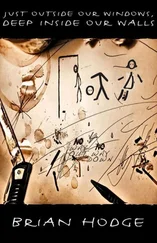“Oh, my optimist.” Adrienne smiled at her, her lean face too thin, cheekbones sharper than before. She wore the recent strains as well, and made them her own. But she was so plaintively hopeful in that smile that all was softened. “I hope you’re right.”
They both turned to look once more at the slumbering Clay when he voiced some low and inarticulate cry from the heart of a nightmare at midmorning. One fist brushed spastically at the side of his face, fell still, curled open. Sarah reached over to drape him with a small blanket they had taken along, and it seemed to calm him. For the moment, at least.
“To dream,” she said, “perchance to sleep.”
* * *
The day ground onward and they lost it to driving, lost an hour in western Kansas when crossing time zones. Kansas would best be driven by night, they decided, when the darkness would conceal the fact that nothing was out there but barrenness, and let you imagine there was something more. Darkness was kind that way.
Six hundred miles brought them to Kansas City, where they stopped to pass the night. Tomorrow, five hundred more and another time zone would put them in Indianapolis, where Clay would have the next day to take care of business that belonged to him alone.
Adrienne used a credit card to get them motel rooms on the outskirts of Kansas City, in that urban perimeter all interstate cities seemed to possess, having evolved for the sole purpose of catering to wayfarers. The same chain motels and the same fast food emporiums, cars fueling up at the same gas stations staffed by the same bored attendants. The great national homogenization, as Sarah saw it — there was something blandly hideous about the trend. After checking in they motored off in search of someplace nearby to eat, but the pickings were merely functional. It would fill a belly and that was all. They should have been too tired and too hungry to care, yet still it seemed an affront.
“Remember I told you I didn’t touch an interstate when I went from Denver to Tempe?” Clay asked Adrienne, and she said she did. “This is why.”
Sarah looked in dismay at the neon, the plastic, the refuse that choked gutters and asphalt and could have blown from any trashcan within two thousand miles. “We’re cutting down every bit of diversity like weeds in a field.”
Clay nodded. “This whole country’s becoming one big putrid mall. Graham used to say that.” She watched him smile at the memory. Missing Graham, for all his spite, or maybe because of it. “I want African food,” he then said. “I want millet and beans and fried plantains. I want to eat it with my fingers. And what is there to choose from? Burger King and Taco Bell. I think I’d have a better meal if I could burn them to the fucking ground instead.”
“Clay,” said Adrienne. “Let’s be reasonable.”
“Okay,” he said. “Give me some matches.”
He was harmless at the moment, Sarah decided, but he had a point. He nearly always had a point. If somewhere deep within Clay really was touched with madness, it was a madness prone to blunt truth. And as they cruised along some boulevard whose name she did not know, colored by splashes of ugly lights, she wondered if Clay might not feel this descent into urban sameness even more acutely than she. To her it was sad, like the erosion of pure and isolated cultures when the world at last penetrates like a rapist to wreak its change… through disease, through missionaries, through the nouveau conceit of This is mine, I will no longer share it, I will hurt you if you touch it again.
But to Clay, seeing city after city, suburb after suburb, each wearing much the same face… wouldn’t that grind at him on a more fundamental level? For when it came to that most unique facet of anyone — the face — Clay would know that his was not his alone. It belonged first to a dozen others. And now hundreds.
How would it feel? That they had been born as standardized entities to fill interchangeable cities? In the light of that horrible meltdown, their visceral rage could be understandable, necessary even — a final straining by their human spirits to break free and reject the shackles of conformity.
Then again, maybe they were merely flukes and anomalies, with no futures.
This time of year, with this weather, interstate travel was safer, swifter, but how much more heartening it might have been to travel the lesser highways, as Clay had done months before, if only to prove to themselves that all was not surrendered out here. She wanted to walk roads peopled by those whose worlds ended two horizons over; to eat in shacks whose menus were painted on sheets of whitewashed plywood. She wanted the time to hang around gas stations owned by bony old men who knew engines better than their wives, to sniff the fumes and prowl the rest rooms when no one was looking, and stare at cigarette butts in the urinals as if they were runes of divination, thrown just so and full of meaning.
She would remain out in the hinterlands until she could read those omens, and know if the future they spoke of was hopeful, or barely worth the bother. Weave those threads into her thesis when she got back, maybe, explore the linkage between anthropology and prophesy.
It was a dream, anyway.
And then they gave up looking, and went for burgers.
Outside of Minnesota’s twin cities, Clay had never been east of the Mississippi. It had been a great river of adventurous unknown in another era. Passing over it the day before, as it churned frigid and gray with slabs of ice, he wondered how Mark Twain had seen it in his time. How its primal pull had felt surging up through the deck of a steamboat; if its ancient muddy allure was anything like the one now compelling him to the East Coast.
The river was behind him now, a state and a half back, but its chilly currents lingered in imagination. It was how he may have traveled a century or more ago, poling himself along atop a raft, anticipating change around every bend. He would have known nothing of chromosomes then; genetics would have provided no scapegoat. Ignorance might really have been bliss.
No more, though. A little knowledge was a dangerous thing, it had been said, and Clay supposed that was true. It could leave you with an addict’s craving for more.
Here he was, living proof: Indianapolis, midday on New Year’s Eve, alone with the car for the first time since they had left Denver. He thought it was an encouraging vote in his favor that Adrienne had let him take her car.
Timothy Van der Leun lived in a tiny house on the southwest side, where I-70 slashed through a flatland of warehouses and grim smokestacks. Clay had phoned from last night’s motel, after consulting his illicit files for the number. He got a confused sort of hello, then hung up after a moment of listening to Van der Leun listening to him breathe. He knew of nothing to say. Better to just go.
He found the street on a local map, then in the car. The block was filled with houses just like one another, small and cramped, creeping toward decrepitude, as if they held dour secrets and were exhausted from the strain. No trees at all to speak of, just scrawny head-high twigs of things. Poisoned by the air, maybe, or by the snow whose last dregs stuck to the lawn like gray scum.
The narrow porch sagged beneath his weight, and Clay knocked. He did not trust the bell to function.
He had to knock again before the door opened, as slowly as if the person behind it were crippled, arthritic. An ever-widening slice of the house greeted him, dim as a cave, all the blinds and curtains drawn.
And then the master of the house.
The face was familiar.
He clung to the door with more weight than should have been borne by his gaunt frame; lost inside his clothes, long, loose sleeves flapping at his knobby wrists. He peered out with eyes that seemed to need moments to shift focus from wherever they had been before, and when they did, his gaze locked on with the fierce melancholy of someone staring at a shattered mirror while waiting for the pieces to meld again.
Читать дальше
